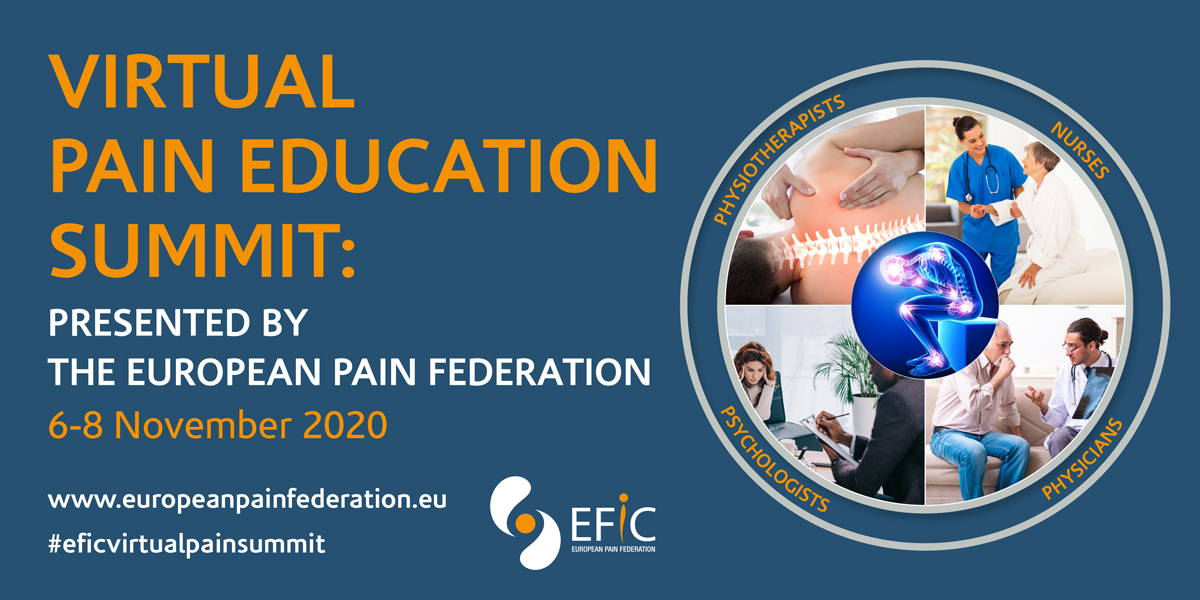The European Pain Federation’s Virtual Pain Education Summit will place a strong emphasis on the importance of different disciplines (e.g. physicians, physiotherapists, psychologists, and nurses) working together. This will be achieved through a number of interprofessional lectures that will equip clinicians with the skills to manage pain from a multidisciplinary perspective.
Pain is always a personal experience that is influenced to varying degrees by biological, psychological, and social factors. Therefore, a biopsychosocial approach is essential to understanding the patient. For many people with chronic pain, this may mean that they do not respond well to a single treatment approach. While a single treatment approach may be adequate for a number of people with chronic pain, it is crucial to identify subgroups that may need more intervention. In particular, people presenting with a significant level of psychological, physical and or social disability may benefit from a referral to a multidisciplinary team as early as possible.
Effective multidisciplinary management of chronic pain requires a core group of healthcare professionals with different skillsets. Together, the team should be able to assess and manage the medical, physical, psychological, emotional, and social aspects of pains in an individualised manner, tailored to the needs and goals of each person. Good communication among the members of the team is vital to effective management.
Multidisciplinary care allows a multidimensional and holistic assessment of chronic pain, aids rapid commencement of treatment following the diagnosis, and ensures each person gets access to a wide array of pharmacological and non-pharmacological treatment options that they need. Improvements in pain intensity, physical functioning, quality of life, emotional distress and return to work have been documented in patients with pain who receive a multidisciplinary approach compared to a single discipline approach.
Don’t miss out our interprofessional lectures:
Neurobiology of pain & strategies to modulate at various levels from MDT perspective
Chair: Andreas Kopf, Germany
- Basic science perspective: Thomas Graven-Nielsen, Denmark
- Physio perspective: Annelee Malfliet, Belgium
- Physchological perspective: TBA
Communicating with the person in pain
Chair: Mary O’Keeffe, Ireland
- In conversation with Chris Main – How to make psychology more approachable to the patient and public: Chris Main, UK
- Considering pain health literacy in the clinic: Brona Fullen, Ireland
- Delivering pain education to the person with osteoarthritis: Tasha Stanton, Australia
Interprofessional working: Who does what, barriers & facilitators to IP working, road map for IP working
Chair: Harm Peters, Germany
- Interprofessional working in pain management: Emma Briggs, UK
- Shared decision making and learning in an interprofessional context: TBA
- Building an interprofessional team: Paul Wilkinson, UK
“Referral Diagnosis Low Back Pain: Only the Tip of the Iceberg” managing pain from a MDT perspective
Chair: Bart Morlion, Belgium
with Koen Bernar, (Belgium), Susan Broekmans (Belgium), Eline Coppens (Belgium), Peter Van Wambeke (Belgium), Hilde Verbeke (Belgium), Sofie Verbruggen (Belgium), Elfi Vergaelen (Belgium)
Pain Prevention (2020 European year against pain) Impact of lifestyle factors
Chair: Brona Fullen, Ireland
- Role of nutrition in pain prevention: Elizabeth Dean, Canada
- Role of physical activity in pain prevention: Joe Tatta, United States
- Role of sleep hygiene and stress management in pain prevention: Anne Söderlund, Sweden
Sign up for the Virtual Pain Education Summit on 6-8 November 2020 here.
